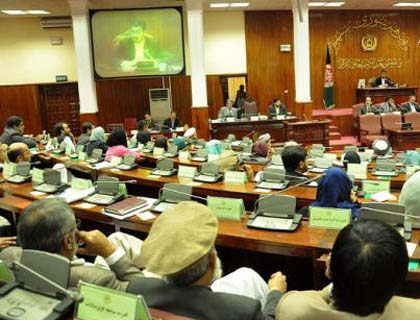KABUL - Legislators on Wednesday asked the government to submit the draft electoral law to the Wolesi Jirga, lower house of parliament, for debate and approval as soon as possible.
Due to reservations from different quarters, the government was trying to avoid placing the draft for parliamentary debate and approval, alleged a member from northern Faryab province.
Naqibullah Faiq said: "We ask the president to submit the proposed law to the house to prevent a possible legal hurdle to upcoming presidential and provincial council elections."
If the draft was not produced before the assembly, MPs would prepare and adopt their own legislation on the subject, he warned.
A public representative from Kabul, Shukria Barakzai said several members were already working on the draft. "Whether or not the government sends us the draft, we are preparing our own piece of legislation."
Speaker Abdur Rauf Ibrahimi, characterizing the proposed law as an extremely important measure, accused the government of failing to answer parliamentary calls for sending it to the house.
"I once again ask them to produce the draft before the house," remarked the speaker, who confirmed the Wolesi Jirga Legislative Commission was working on its own electoral law.
The presidential and provincial council elections are slated for April 5, 2014. The presidential vote results will be announced on May 14 and the provincial council polls June 7.
If no presidential candidate receives more than 50 percent of the votes, a runoff election will be held on May 22. Registration of nominees will begin on the 15th of September, 2013.
Legal experts and civil society activists say the draft law introduced by the poll panel is marred by flaws and, if approved in the present form, it could jeopardize the electoral system.
Under the draft law, political parties will compete for a third of parliamentary seats in provinces, with independent candidates running for the remaining two-thirds of berths.
Over the past 10 years, presidential and parliamentary elections were held in compliance with legislative decrees, which placed restrictions neither on political parties' nominees nor on independent runners. (Pajhwok)

